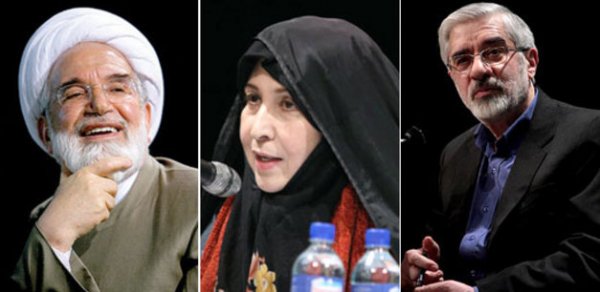Ending House Arrest of Dissident Leaders Not on Administration’s Agenda, Says Justice Minister
In a startling statement during an interview with the Iran Labor News agency (ILNA) about the house arrests imposed on the Green Movement leaders Mir Hossein Mousavi, Mehdi Karroubi, and Zahra Rahnavard since 2011, Iran’s Minister of Justice Mostafa Pourmohammadi said on December 16, 2014, that “the issue [of the house arrest] has not been pursued inside the administration.” Pourmohammadi told ILNA that neither the government nor the Judiciary can solely pursue a resolution to the issue, and that the ultimate decision maker in this issue is the Supreme Security Council.
“It’s possible that Mr. Rouhani has pursued the issue of the house arrest, but I don’t know what the results were. Perhaps he was also pursuing the issue at the [Supreme] National Security Council, but the issue has not been pursued inside the administration,” he said, adding, “I must add that this topic has never been discussed in the cabinet so far.”
However, Mohammad Bagher Nobakht, the Spokesperson for the Rouhani government said on October 8, 2014, that the administration is not indifferent to the issue of the house arrests, and that it is pursuing the issue. The necessity for ending the house arrests of the Green Movement leaders was one of the main slogans in Hassan Rouhani’s election campaign in 2013.
In a new allegation, Saeed Jalili, Ali Khamenei’s representative at the Supreme National Security Council, said on December 2 that the house arrest of Mir Hossein Mousavi and Mehdi Karroubi is not related to the events of 2009, and that they were put under house arrest a year later for their efforts to start “a new sedition” in the country. Iranian officials refer to the protests following the disputed 2009 presidential election as “sedition.”
In a statement about the need for ending the house arrests of the Green Movement leaders, Member of Parliament Ali Motahari said on December 16, that “a continuation of this situation is not in the best interest of anyone in our system,” adding, “If one of these gentlemen, who have reached old age, passes away under these circumstances, a festering wound will be created in the society.” Addressing those who say the Green Movement leaders must express remorse and repent, Ali Motahari said, “When we don’t let them talk, how are they supposed to repent?”
On December 13, seven former Members of the Iranian Parliament published a statement criticizing the ongoing house arrests of the three leaders, calling it “holding a grudge against voters.” The statement was signed by Noureddin Pirmoazzen, Fatemeh Haghighatjoo, Aliakbar Mousavi (Khoeini), Ali Mazrouei, Esmail Gerami Moghaddam, Ahmad Salamatian, and Hassan Yousefi Eshkevari.
On October 7, Ali Motahari wrote a letter to President Rouhani, reminding him that keeping the three opposition leaders under house arrest is against the Iranian constitution, and warning Rouhani that continued negligence in releasing the three would result in his making an official inquiry of the President at the Iranian Parliament. In answer to this statement, Mohammad Bagher Nobakht said on October 8 that Mr. Motahari does not have all the information and that the government works with wisdom, adding that the President is loyal to his commitments.
Four years later, many state officials still oppose lifting the house arrests. In his latest statements, Gholamhossein Gheibparvar, the IRGC Fars Province Commander said on December 9 that Mir Hossein Mousavi, Mehdi Karroubi, and former President Mohammad Khatami are “political filth,” and that the three could never be cleansed without expressing remorse.
Reacting to the demand by Mir Hossein Mousavi and Mehdi Karroubi for a trial, Asadollah Badamchian, Deputy Director of the Islamic Coalition Party (Motalefeh) said on December 1, “If a court is convened, their definite sentence will be death.”







